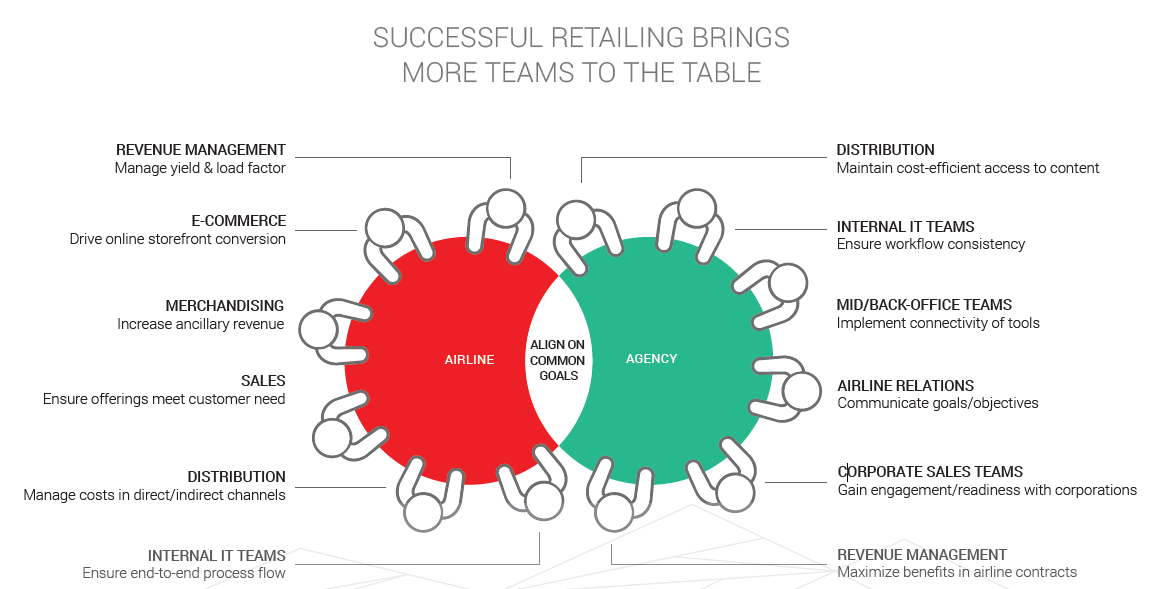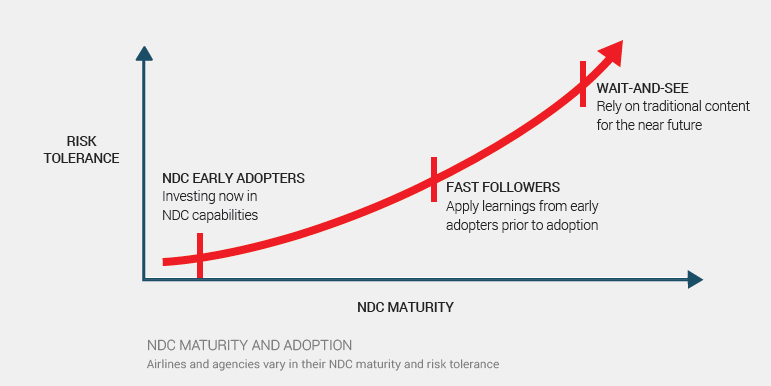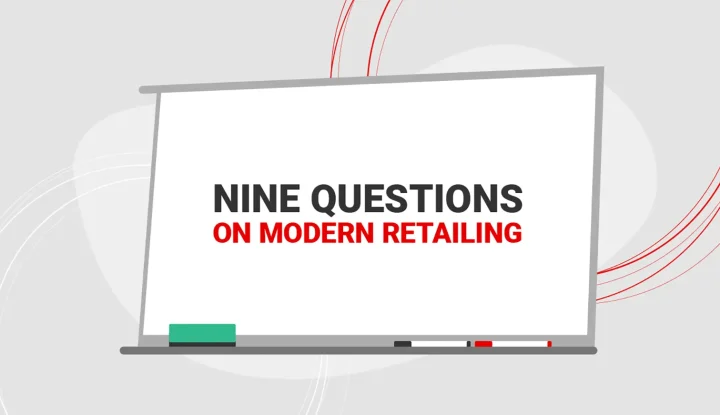The time for the travel industry to transform into intelligent retailers is now. Airlines and agencies are focused on new NDC retailing and distribution capabilities to support this transformation. The technology is here. Now what?
At Sabre, our airline-retailing strategy will take you beyond NDC and lead you through this vital transformation. We recommend four steps to help get you started on your NDC journey:
- Bring the right players to the table.
- Align your strategy and objectives.
- Reach outside your organization.
- Partner with the right technology providers.
Some players will not adopt NDC at all, whereas others will lead the way. Either way, Sabre can support all your content, all the time. We’re ready. Are you?
Step 1: Bring the right players to the table
Retailing in an airline or travel agency is not the responsibility of a single team. You will need to build cross-functional teams internally, bringing together people and departments who may previously have had completely different goals. Now is the time to align.
It’s important to talk to members of departments who wouldn’t typically help define the retailing strategy to understand the downstream implications of any decisions.
Airlines are already making progress bringing e-commerce, merchandising and distribution teams together. The next critical step is giving revenue management a seat at the table. Bringing decision-support teams into the conversation ensures the retailing strategy considers how the offers are created in the first place. As a result, revenue management teams can starts to think about the downline impacts to agency partners and distribution contracts rather than the pricing of flights alone.
Bringing the right players to the table not only provides goal alignment, it ensures teams have an end-to-end view of the entire customer journey – from offer creation through fulfillment.

Step 2: Align your strategy and objectives
With the right players at the table, airlines and agencies need to define three strategies to support their NDC initiatives:
- A customer strategy that centers around the traveler and needs of corporate customers
- A retailing strategy that focuses on intelligent solutions
- A technology strategy that supports integrated content
Customer-first strategy
Too often in travel, we make the customer book the way we need them to; however, to become an intelligent retailer, we need to understand how the traveler wants to book and then personalize that experience.
Customer centricity goes beyond retailing to distribution and fulfillment, so mapping the entire customer journey is vital. During inclement weather and other disruptions, airlines need to be able to seamlessly fulfill all the ancillary products and services they offer customers. In addition, agencies need to ensure duty-of-care responsibilities are maintained, especially in a post-pandemic world.
While airlines and agencies vary in their approach and end goals, the one thing everyone has in common is the customer. Without a great customer experience, none of us can win.
Ask these questions when determining your customer strategy:
- What type of experience do you want to give your customers?
- How do needs differ between the traveler and corporations?
- How can you make buying and purchasing travel a thrilling part of the whole trip experience?
- How can you drive customer conversion and loyalty?
To some extent, airlines have already achieved customer-journey mapping in their direct channels, but they need to partner closely with agencies to understand how this plays out in indirect channels, and especially for corporate travel customers. This is where our beyond NDC approach takes your retailing strategy to the next level.
Intelligent retailing strategy
To ensure existing retailing and distribution strategies are aligned with the Beyond NDC world, airlines and agencies will likely need to change their approach and culture.
Airlines that aim to become intelligent retailers should:
- Consistently review their performance to determine if they’re optimizing the markets they serve
- Evaluate existing products and services to understand performance
- Leverage data around revenue for ancillary sales
- Align offer/order management systems
Now, agencies can present the same–or even better–content that airlines have on their websites. This translates into a better customer experience, increased product knowledge and more customer options. But agencies must understand the retailing strategies of their airline partners. It is also important to consider the risk of not acting. “If airlines don’t move, they risk being passed by carriers that are much more effective retailers,” said Willy Goderis, principal consultant for Sabre. “Ultimately, they will be forced back into selling a commodity and competing on price rather than the entire travel experience.”
Step 3: Reach outside your organization
While key players in the travel ecosystem continue to move at a different pace, collaboration and open communication between airline and agency partners is critical. It’s important to not only assess the maturity level and risk tolerance for NDC within your own organization, but to align that with your partners. Some airlines and agencies are already investing while others want to watch for proven success before making considerable NDC investments.

Airlines won’t be able to scale their indirect retailing strategy without agency alignment, and agencies will struggle to communicate their value without the support of their airline partners.
Agencies need to define what success looks like for their business and present it to the airline. They should work with the airline to understand how NDC content will help them achieve their goals and how agency success will be recognized. The most effective airlines will work with their agency partners to help them understand that richer NDC content is not a process disruption, but rather a revenue-generating opportunity.
“Airlines will be engaging with agencies in a new way to fully understand the agency business strategy, their workflow and their day-to-day challenges.” – Lisa Le, Practice Leader, NDC Consulting, Sabre
Ultimately, airlines and agencies need to innovate together, which requires behavior changes, to take advantage of the rich content NDC offers and provide the best product and service to travelers.
Step 4: Partner with the right technology providers
Building retailing capabilities can be an expensive and long-term investment. Identifying opportunities that will drive revenue growth, increase your competitive advantage and form a stronger brand is essential. Sabre is prepared as a technology partner to make your retailing strategy a reality.
For Airlines
This evolution to retailing will not be achieved overnight. Best practice is for airlines to take a phased approach to solution adoption, ultimately resulting in NDC-enabled offer- and order-management platforms. There are six key phases recommended to enable intelligent, personalized retailing:
1. Strengthening the core — Start with an investment in core capabilities such as inventory controls, an ancillary platform and an integrated payment platform.
2. Market and customer data — Personalized offers start with having a 360-degree view of customers. Marketplace data, for example, is a key source from the GDS that can be leveraged to gain real-time insight into passenger demand.
3. Revenue optimization — Intelligent decision support is essential to creating smart offers. Pricing optimization determines the right strategic price points, taking into consideration passenger demand, willingness to pay and competitive positions.
4. Omni-channel digital ecosystem — When building your retailing ecosystem, think about implications for both direct and indirect channels. By leveraging microservices, you can drive consistent content and user experiences across all channels.
5. Offer-management system — Inputs from market and customer data and decision-support tools power the shopping engine, with persona-based and ultra-fast shopping responses. Additionally, the rules engine executes on the offer then validates and stores.
6.Order-management system — With an integrated order-management system, you can ensure offers are seamlessly fulfilled. In the event of irregular operations, it also offers the flexibility for orders to be changed or cancelled.
For Agencies
Agencies, on the other hand, should look to their IT providers to ensure they can take advantage of NDC content while avoiding any disruption to regular service. The existing distribution standards are surrounded by a series of support and operational products and services that have been developed by Sabre and other GDS providers to support workflows in use by agencies today. Going beyond NDC with Sabre means protecting those valuable support and operational needs.
To achieve success, it’s important to consider these six tenets:
1. Active reservations synchronization – Agencies must be aware of changes to the PNR by the airline directly, and they must be fed back into the agency systems.
2. Trip lifecycle management and duty of care – Agency and travel management companies (TMC) need to know exactly where their customers are at all times. In addition, ensuring duty-of-care needs are supported is key to our Beyond NDC initiative.
3. Support mid-/back-office audit processes – Solutions that provide history of the actions and changes that have taken place and drive support processes such as invoicing, accounting, mid and back office, and receipts will continue with NDC content.
4.Corporate policy compliance – Knowing this is also key to corporations, agencies & TMCs, this element must continue with new distribution solutions.
5. Comparison shopping – Customers simply want the best fares, so both traditional content and NDC content must be available in a single search to ensure that the best offer is obtained.
6. Platform investments and scalability needs – We understand these new business requirements require significant re-engineering. They require a strong, stable platform and a long-term technical strategy with scalability to support evolving retailing offerings.
By partnering with technology providers and leveraging a phased approach, airlines can mitigate risk associated with large-scale IT transformation projects and allow for earlier value realization. For agencies and TMCs, technology scalability and seamless integration with existing workflows helps ensure business disruption is mitigated whilst new value is created.
With the right approach and partners, building NDC retailing capabilities becomes so much easier.





